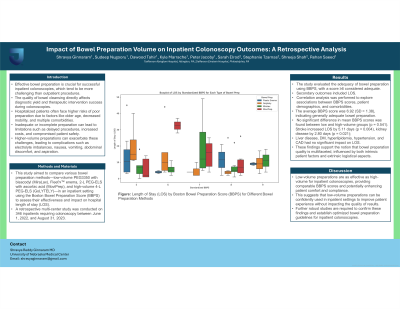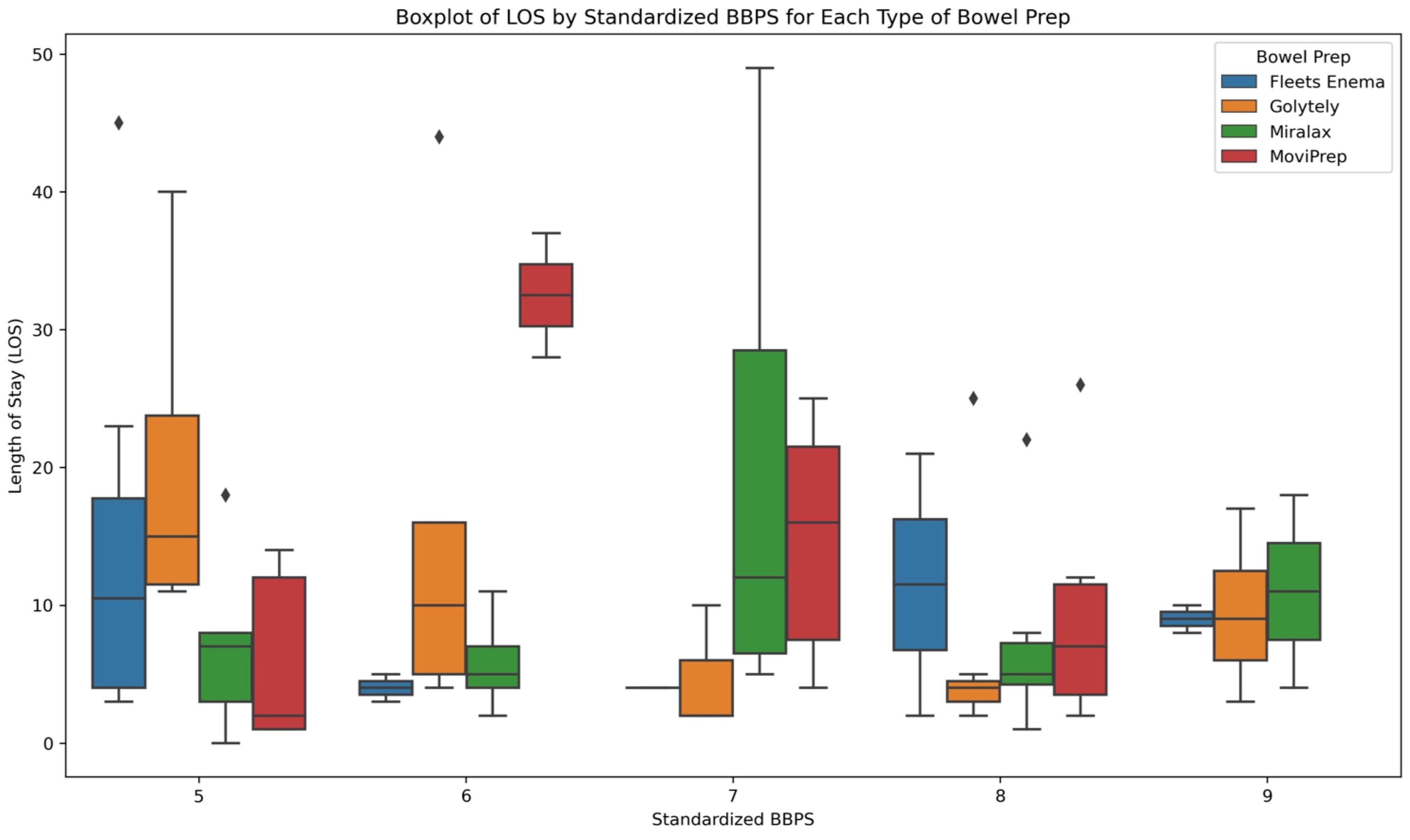Monday Poster Session
Category: General Endoscopy
P2381 - Impact of Bowel Preparation Volume on Inpatient Colonoscopy Outcomes: A Retrospective Analysis
Monday, October 28, 2024
10:30 AM - 4:00 PM ET
Location: Exhibit Hall E

Has Audio

Shravya Ginnaram, MD
Jefferson Abington Hospital
Willow Grove, PA
Presenting Author(s)
Shravya Ginnaram, MD1, Sudeep Nugooru, MD, MBA1, Dawood Tahir, MD1, Kyle Marrache, DO2, Peter Jacoby, MD2, Sarah Elrod, DO2, Stephanie Tzarnas, MD3, Shreeja Shah, MD2, Rehan Saeed, MD2
1Jefferson Abington Hospital, Willow Grove, PA; 2Jefferson Abington Hospital, Abington, PA; 3Einstein Medical Center, Philadelphia, PA
Introduction: Effective bowel preparation is crucial for successful inpatient colonoscopies, which tend to be more challenging than outpatient procedures. The quality of bowel cleansing directly affects diagnostic yield and therapeutic intervention success during colonoscopies. Hospitalized patients often face higher risks of poor preparation due to factors like older age, decreased mobility, and multiple comorbidities. Inadequate or incomplete preparation can lead to limitations such as delayed procedures, increased costs, and compromised patient safety. Higher-volume preparations can exacerbate these challenges, leading to complications such as electrolyte imbalances, nausea, vomiting, abdominal discomfort, and aspiration.
Methods: This study aimed to compare various bowel preparation methods—low-volume PEG3350 with bisacodyl (MiraLax), Fleet's™ enema, 2-L PEG-ELS with ascorbic acid (MoviPrep), and high-volume 4-L PEG-ELS (GoLYTELY)—in an inpatient setting using the Boston Bowel Preparation Score (BBPS) to assess their effectiveness and impact on hospital length of stay (LOS).
Results: A retrospective multi-center study was conducted on 346 inpatients requiring colonoscopy between June 1, 2022, and August 31, 2023. The study evaluated the adequacy of bowel preparation using BBPS, with a score ≥6 considered adequate. Secondary outcomes included LOS. Correlation analysis was performed to explore associations between BBPS scores, patient demographics, and comorbidities.
The average BBPS score was 6.92 (SD = 1.38), indicating generally adequate bowel preparation. No significant difference in mean BBPS scores was found between low and high-volume groups (p = 0.541). Stroke increased LOS by 5.11 days (p = 0.004), kidney disease by 2.80 days (p = 0.021); Liver disease, DM, hyperlipidemia, hypertension, and CAD had no significant impact on LOS. These findings support the notion that bowel preparation quality is multifaceted, influenced by both intrinsic patient factors and extrinsic logistical aspects.
Discussion: Low-volume preparations are as effective as high-volume for inpatient colonoscopies, providing comparable BBPS scores and potentially enhancing patient comfort and compliance. This suggests that low-volume preparations can be confidently used in inpatient settings to improve patient experience without impacting the quality of results. Further robust studies are required to confirm these findings and establish optimized bowel preparation guidelines for inpatient colonoscopies.

Disclosures:
Shravya Ginnaram, MD1, Sudeep Nugooru, MD, MBA1, Dawood Tahir, MD1, Kyle Marrache, DO2, Peter Jacoby, MD2, Sarah Elrod, DO2, Stephanie Tzarnas, MD3, Shreeja Shah, MD2, Rehan Saeed, MD2. P2381 - Impact of Bowel Preparation Volume on Inpatient Colonoscopy Outcomes: A Retrospective Analysis, ACG 2024 Annual Scientific Meeting Abstracts. Philadelphia, PA: American College of Gastroenterology.
1Jefferson Abington Hospital, Willow Grove, PA; 2Jefferson Abington Hospital, Abington, PA; 3Einstein Medical Center, Philadelphia, PA
Introduction: Effective bowel preparation is crucial for successful inpatient colonoscopies, which tend to be more challenging than outpatient procedures. The quality of bowel cleansing directly affects diagnostic yield and therapeutic intervention success during colonoscopies. Hospitalized patients often face higher risks of poor preparation due to factors like older age, decreased mobility, and multiple comorbidities. Inadequate or incomplete preparation can lead to limitations such as delayed procedures, increased costs, and compromised patient safety. Higher-volume preparations can exacerbate these challenges, leading to complications such as electrolyte imbalances, nausea, vomiting, abdominal discomfort, and aspiration.
Methods: This study aimed to compare various bowel preparation methods—low-volume PEG3350 with bisacodyl (MiraLax), Fleet's™ enema, 2-L PEG-ELS with ascorbic acid (MoviPrep), and high-volume 4-L PEG-ELS (GoLYTELY)—in an inpatient setting using the Boston Bowel Preparation Score (BBPS) to assess their effectiveness and impact on hospital length of stay (LOS).
Results: A retrospective multi-center study was conducted on 346 inpatients requiring colonoscopy between June 1, 2022, and August 31, 2023. The study evaluated the adequacy of bowel preparation using BBPS, with a score ≥6 considered adequate. Secondary outcomes included LOS. Correlation analysis was performed to explore associations between BBPS scores, patient demographics, and comorbidities.
The average BBPS score was 6.92 (SD = 1.38), indicating generally adequate bowel preparation. No significant difference in mean BBPS scores was found between low and high-volume groups (p = 0.541). Stroke increased LOS by 5.11 days (p = 0.004), kidney disease by 2.80 days (p = 0.021); Liver disease, DM, hyperlipidemia, hypertension, and CAD had no significant impact on LOS. These findings support the notion that bowel preparation quality is multifaceted, influenced by both intrinsic patient factors and extrinsic logistical aspects.
Discussion: Low-volume preparations are as effective as high-volume for inpatient colonoscopies, providing comparable BBPS scores and potentially enhancing patient comfort and compliance. This suggests that low-volume preparations can be confidently used in inpatient settings to improve patient experience without impacting the quality of results. Further robust studies are required to confirm these findings and establish optimized bowel preparation guidelines for inpatient colonoscopies.

Figure: Length of Stay (LOS) by Boston Bowel Preparation Score (BBPS) for Different Bowel Preparation Methods
Disclosures:
Shravya Ginnaram indicated no relevant financial relationships.
Sudeep Nugooru indicated no relevant financial relationships.
Dawood Tahir indicated no relevant financial relationships.
Kyle Marrache indicated no relevant financial relationships.
Peter Jacoby indicated no relevant financial relationships.
Sarah Elrod indicated no relevant financial relationships.
Stephanie Tzarnas indicated no relevant financial relationships.
Shreeja Shah indicated no relevant financial relationships.
Rehan Saeed indicated no relevant financial relationships.
Shravya Ginnaram, MD1, Sudeep Nugooru, MD, MBA1, Dawood Tahir, MD1, Kyle Marrache, DO2, Peter Jacoby, MD2, Sarah Elrod, DO2, Stephanie Tzarnas, MD3, Shreeja Shah, MD2, Rehan Saeed, MD2. P2381 - Impact of Bowel Preparation Volume on Inpatient Colonoscopy Outcomes: A Retrospective Analysis, ACG 2024 Annual Scientific Meeting Abstracts. Philadelphia, PA: American College of Gastroenterology.
